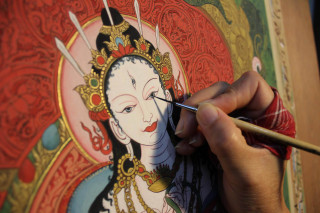Journal 24 April 2019
Paubhā painting at the school of traditional arts
Traditional Paubhā painting master Dr Renuka Gurung shares the history behind this spiritual Nepalese art form
How did you become interested in the Paubha tradition?
Beautifully painted paintings displayed in the shops and the monasteries of Nepal have always been a source of inspiration to me and encouraged me towards learning to paint such images ever since I saw them. I always used to be drawn by such beautifully painted paintings. When I finally got an opportunity to learn the technique of painting traditional images the immense joy and profound peace that I experienced while painting such beautiful images using early traditional paintings, methods and materials of paubhā painting tradition, and learning the history of the paubhā painting, the ritual, spirituality, philosophy as well as the place of such painting in the community of Newar Buddhist community made me more interested in understanding more deeply about the paubhā painting tradition.

Where did you study?
I studied the technical aspects of the contemporary paubhā painting tradition in Nepal with Mr. Lok Chitrakār, a well-known master paubhā painter at his studio, the Simrik Atelier in the Lalitpur district for some years. Then after this, I learnt about the spiritual aspects of the early paubhā painting tradition with the renowned priest, the late Mr. Badri Ratna Vajracharya (Guruju). Many other practising traditional painters of all the districts of the Kathmandu, Lalitpur and Bhaktapur districts, Vajracharya priests and the monks have also contributed immensely to helping me develop my understanding and my practice.
How did this prepare you for projects after you finished studying?
The intensive study, research and practice that I undertook during my doctoral degree gave me a deeper insight into the true meaning of the traditional arts that we practice in our country. This helped me to stand upon a strong foundation of the understanding of the profound depth of our cultural heritage and the need for nourishing and preserving the roots of our heritage for the welfare of future generations.
What has been your most challenging project?
To acquire the true practices of the traditional arts and communicate the language of the paubhā painting tradition in the community has been my greatest challenge. It is clearly evident that whole world at present is moving forward a new direction with big ideas and creativity in unimaginable velocity. This speed has contributed to a disregard for, or ignorance of, the true wealth that is bestowed through cultural heritage. This not only prevents upcoming generations from acquiring true understanding of their own heritage but also equally weakens the fabric of the community. Thus, it becomes immensely important to comprehend the language of the traditional practices and disseminate it to the community for the universal welfare.
What is particularly exciting about teaching at The Prince's School of Traditional Arts?
It is always exciting to teach the traditional arts of Nepal at The Prince’s Foundation School Of Traditional Arts, London. I am immensely grateful to the School because it has not only given me an opportunity to share the traditional knowledge, history, and techniques of the paubhā painting tradition of Nepal to the international students but it has also equally provided recognition of the glorious traditions of Nepal.
Dr Renuka Gurung will be teaching a short course, Paint an image of White Tara, at The Prince's School of Traditional Arts between 20 May 2019 - 24 May 2019. For information and to book your place visit psta.org.uk.



